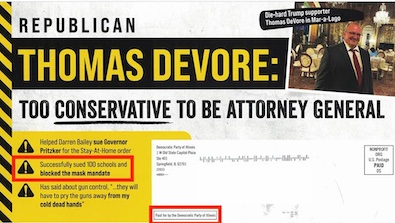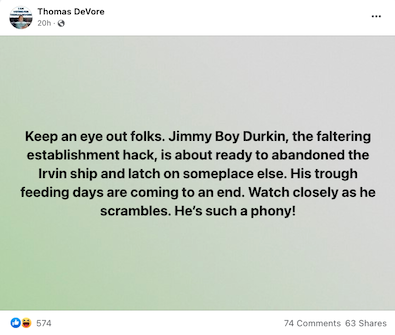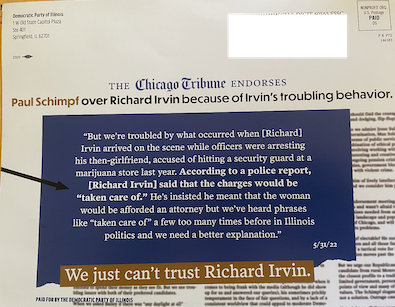|
Comments Off  
|
|
Comments Off  
|
Campaign notebook
Wednesday, Jun 22, 2022 - Posted by Rich Miller
* Tom DeVore added the red highlighting on this piece when he posted it to Facebook and thanked the Democratic Party of Illinois for the exposure. This primary just gets weirder and weirder by the day, man…

The governor and DPI are empowering the Republican fringe. Hope that doesn’t backfire on them.
…Adding… From the Steve Kim campaign…
Illinois Democrats began sending mail pieces today in an effort to promote Steve Kim’s primary opponent, a downstate lawyer embroiled in personal lawsuits and character questions. In what has become a habit for JB Pritzker and his Democrat allies, they are meddling in another Republican primary to get the nominee who is easier to beat in November.
Steve Kim is the biggest threat to Kwame Raoul’s incumbency, and JB Pritzker knows it. An experienced attorney, Steve isn’t afraid to take on the corrupt political machine that Illinois Democrats have cultivated for decades.
* More outside money boosting Mary Miller and dinging Rodney Davis…
* 2019 story about Mary Miller’s first congressional race…
Gray is one of six Republicans and four Democrats who filed for the post. One of the other Republicans is Mary Miller, wife of state Rep. Chris Miller, R-Oakland. Rep. Miller was at the Statehouse on Wednesday and had a quick answer when asked why his wife would be better for the district than Gray.
“The biggest thing is, she actually lives in the district that she’s running for,” Miller said. “That’s always a bonus. She’s lived there for 40 years and knows the people there.”
One entry in Gray’s resume is being Trump’s Illinois and Missouri state director leading up to the 2016 primaries. That didn’t sway Rep. Miller, who said living outside the district would be a political “death sentence.”
“I think the old term was carpetbagger,” he said.
Rodney Davis campaign today…
“Politician Mary Miller is a carpetbagger because she’s running in a district she doesn’t live in, and Mary’s husband Chris agrees. He attacked another Republican not too long ago for being a ‘carpetbagger’ since they didn’t live in the district, also calling it a political ‘death sentence.’ Chris Miller says a lot of things, but he’s right on this issue. Mary Miller just wants to be in Congress. She doesn’t care about her community since she’s abandoning her neighbors and most of her constituents to run somewhere else. Rodney Davis is the only Republican candidate in the 15th District who actually lives in the 15th District.” - Aaron DeGroot, Davis campaign spokesperson
* Snarky email…
Hi Rich,
Newman got endorsed by her Field Director, Ben Goldberg along with 11 other former Warren volunteers.
This could shake up the race in the closing days.
* Click here for the full report. NALEO…
The National Association of Latino Elected and Appointed Officials (NALEO) Educational Fund today released its 2022 Illinois and Chicago Latino Voter Profile, offering a comprehensive analysis of the Latino electorate in Illinois and Chicago — including demographic trends and population growth. With the Illinois Primary taking place next week on June 28, the profile examines the political factors shaping the state’s Latino electorate, such as the outcome of the 2020 Census and the recent redistricting. The profile also includes projections of how the Illinois Latino population is expected to show up to the polls for the state’s November elections.
According to the projections, more than 353,000 Latinos in Illinois will be casting ballots this November, mirroring 2018’s historic turnout numbers and marking a 62.2 percent increase from 2014. In addition, Illinois’ Latino voters are expected to be younger than non-Latino voters, with 18–24-year-olds comprising 15 percent of registered Latinos, compared to 7 percent of non-Latinos. Similarly, 25 percent of Latino registered voters are 25–34-year-olds, compared to 16 percent of non-Latinos.
“Latino candidates are poised to make history in November, with the prospect of two Latinos being elected to Illinois’ congressional delegation for the first time,” said NALEO Educational Fund CEO Arturo Vargas. “Latino turnout may build on the momentum of past political seasons like that of 2018, but this momentum will not be sustained without early and robust engagement of Latino voters by candidates and campaigns. Latinos value electoral participation and care about the people who represent them, and it is critical that those seeking their votes address the community’s needs and priorities.
Key Findings Include:
• More than 353,000 Latinos in Illinois will cast their ballots in November 2022, marking a 62.2 percent increase from 2014.
• The Latino share of all Illinois voters in 2022 is expected to be 7.9 percent, which mirrors the Latino share in both 2018 and 2014.
• Twelve percent of voting-age citizens in Illinois are Latino.
• Latino registered voters in Illinois tend to be younger than non-Latinos, with 18–24-year-olds comprising 15 percent of registered Latinos, compared to 7 percent of non-Latinos. Similarly, 25 percent of Latino registered voters are 25–34-year-olds, compared to 16 percent of non-Latinos.
• Between 2010 and 2020, Illinois’ population decreased from 12.83 million to 12.81 million, decreasing 0.1 percent. During the same period, the state’s Latino population grew from 2 million to 2.3 million, increasing 15.3 percent. By comparison, the state’s non-Latino population decreased by 3.0 percent.
• In 2021, 134 Latinos served in elected office in Illinois — with 87 percent serving at the local level, including county, municipal, school board, and judicial officials.
Several factors will further shape the political landscape for Illinois’ midterm elections, including the redistricting that followed Census 2020, the competitiveness of congressional and statewide contests, and the effectiveness of voter engagement efforts targeting the Latino community.
* Press release…
With less than one week left until the June 28th primary, Liz Brown-Reeves, candidate for 15th Democratic State Central Committeeman, is finishing strong with major endorsements and union support.
“There is no one in the 15th Congressional District who better represents the values of Democrats and can position our party for success during these uncertain times, and that is why I am proudly endorsing my good friend Liz Brown-Reeves for Democratic Central Committeeman,” said former State Senator Andy Manar. “I have known Liz for twenty-two years, and in that time she has fought tirelessly to get things done in the statehouse on behalf of working families and organized labor. From running campaigns to fundraising for candidates up and down the ballot, she has the experience we need right now when so much is at stake for both our party and our democracy.”
As part of his endorsement, Manar contributed $30,000 in support of Liz’s campaign.
Manar joins the long list of supporters for Liz Brown-Reeves’s campaign including:
Governor JB Pritzker
Secretary of State Jesse White
Former Congressman Jerry Costello
Assistant Majority Leader Representative Jay Hoffman
Senator Doris Turner
Former State Representative Julie Curry
UA (Plumbers & Pipefitters) Illinois PAC
IBEW Local 15
Painters District Council 14
Laborer’s (LIUNA) Midwest Union
Police Benevolent & Protective Association
Mid-America Carpenters
Chicago Land Operators & Joiners
SMART Union
“I am so humbled and excited to receive the endorsement of former Senator Manar. No one has done more for the citizens of downstate Illinois than Andy,” said Liz Brown-Reeves. “Organized labor has also been the backbone of my career and I would not be where I am today without the partnership and support of unions throughout Illinois.”
* Sad news…
John Fritts, former Lee County treasurer and campaign manager for a his cousin, 74th District candidate Bradley J. Fritts, died Monday in a two-car crash in rural La Salle County near Earlville. […]
“John, who was managing Brad’s campaign for Illinois State Representative, was killed in a car accident in Earlville, IL Monday afternoon. Several family members were also in the car and Brad was sent to the hospital with non-life threatening injuries.
“Please keep the family in your prayers as they deal with this sudden tragedy. John is known best for his smile. We love him very much.”
* More…
* Nicolosi campaign accused of forging signatures of senior home residents: According to a criminal complaint filed on April 21st, five residents of the Cedarhurst Senior Living Center, 7130 Crimson Ridge Drive, are victims of aggravated identity theft against a person 60 years of age or older for signatures that appear on Nicolosi’s petition.
* Jesse Sullivan visits Peoria for ‘Save Illinois Rally’
* Illinois secretary of state Democratic primary: Valencia squares off with Giannoulias and Moore
* 27th House Democratic primary may be winner-take-all affair with no Republican filed
* Cook County Assessor Fritz Kaegi touts fairer property tax valuations; challenger Kari Steele says he’s broken reform promises, created ‘chaos’
46 Comments  
|
* Planned Parenthood Action…
Gov. Pritzker: Act Now to Ensure Equal Access to Abortion
Roe v. Wade is on the cusp of being overturned. If that happens, every state surrounding Illinois will either quickly ban or severely restrict abortion access. In the last few years, we’ve made a lot of progress protecting reproductive rights in Illinois. We’ve repealed dangerous abortion restrictions and passed the Reproductive Health Act (RHA), which enshrines reproductive rights as fundamental rights in Illinois.
However, rights are meaningless without the resources to access abortion!
Ask Gov. JB Pritzker make sure that Illinois guarantees equal access to abortion
Right now — in Illinois and most of our neighboring states — many people cannot access the abortion they need and deserve. Barriers include cost, distance, lack of child care, and no paid time off work. In states surrounding Illinois, patients must also navigate medically unnecessary waiting periods. This situation will only become more dire once Roe falls and millions of people find themselves in a vast abortion desert with Illinois serving as the health care oasis.
We need Gov. Pritzker’s leadership to ensure Illinois is the critical access state he promised it to be. Gov. Pritzker needs to cut the red tape that puts barriers between providers and patients. As New York, California, and Oregon have done, Illinois needs to step up with funding that will support providers, advocates, and patients.
Urge Gov. Pritzker to act now to ensure Illinois lives up to its promise to be a critical access state for abortion.
Together, we can make sure that everyone, no matter their zip code, income, or identity, can access abortion in Illinois.
* Jordan Abudayyeh…
Gov. Pritzker has spent his life fighting to protect and expand reproductive rights. As he has clearly said, Illinois will remain a free state where women can access the abortion care they need without unnecessary restrictions. He looks forward to working with advocates and the General Assembly to discuss additional steps to ensure reproductive rights are accessible and protected.
22 Comments  
|
Question of the day
Wednesday, Jun 22, 2022 - Posted by Rich Miller
* Patty Wetli at WTTW…
Illinois has launched a new offensive in the war on invasive Asian carp. Think of it as Operation Rebrand.
On Wednesday, Illinois officials announced a new name for the carp, which is actually an umbrella name for bighead, black, grass and silver carp. They will now be referred to collectively as copi.
The name copi is a nod to how “copious” the fish are, officials said in a statement, copious being a generous description of the way the invasive fish have overrun Midwestern waterways.
Illinois took the initiative in renaming the Asian carp given the state’s position as a sort of “last stand” against the carp entering the Great Lakes.
“Illinois has a special responsibility to do everything in its power to manage these fish,” said Jayette Bolinski, spokesperson with the Illinois Department of Natural Resources. “That’s why we’re leading the way on rebranding the fish and establishing a supply chain” for the fish as a food source.
* The Question: Will you eat copi? Please explain your answer and snark is not discouraged.
43 Comments  
|
* Lynn Sweet…
More outside spending from the crypto industry to boost House Democratic 1st Congressional District candidate Jonathan Jackson reported to the Federal Election Commission brings the total to $1,041,899 as of Tuesday. […]
Web3 Forward, DAO for America and “Protect Our Future” political action committee are spending enough money to influence the outcome of the 1st District race at the same time the cryptocurrency industry — facing a crisis as prices have crashed — is increasing its political spending to shape how Congress regulates the digital asset business.
Go read the rest.
7 Comments  
|
* First, some background from the Illinois Radio Network…
Some Illinois residents could soon receive a check as part of a settlement in a class action lawsuit against Google.
The lawsuit, which is similar to the one settled recently with Facebook, claimed the company violated the state’s Biometric Information Privacy Act with the Google Photos app. According to plaintiffs, the social media platform illegally used facial recognition data, gathered without consent, to prompt users to tag their friends in photos.
“Illinois does have the most far reaching biometric information protection law in the country,” said Ed Yohnka, director of communications with the ACLU of Illinois. “Illinois has been a place that has really protected the privacy of individuals who live here.”
* More from NBC 5…
Illinois’ Biometric Privacy Act prohibits private sector companies and institutions from collecting biometric data from unsuspecting citizens in the state or online, no matter where the business is based. Data cannot be sold, transferred or traded. Unlike any other state, citizens can sue for alleged violations, which has sparked hundreds of David-and-Goliath legal battles against some of the world’s most powerful companies.
If a company is found to have violated Illinois law, citizens can collect civil penalties up to $5,000 per violation compounded by the number of people affected and days involved. No state regulatory agency is involved in enforcement.
* Crain’s…
A question about repealing or modifying the Illinois Biometric Information Privacy Act, which has inundated business with class-action lawsuits, provided each candidate an opportunity to lambast Michael Madigan or the legislative body he controlled as speaker for 36 years.
“Mike Madigan’s decision to hand policy control to the trial lawyers for decades has taken its toll on the state’s economy,” Irvin says. “Alongside cutting income taxes, lowering property taxes, getting crime under control and rooting out corruption, curbing lawsuit abuse is an important element of a comprehensive economic growth strategy.” Bailey says, “Illinois has a long history of being a haven for abusive lawsuits, and the legislature has been complicit in enacting legislation that has worsened a bad situation. I have consistently opposed these unnecessary efforts.”
Your thoughts?
34 Comments  
|
Today’s quotable
Wednesday, Jun 22, 2022 - Posted by Rich Miller
* The Better Government Association’s David Greising on WBBM today…
Tom Cullerton had, until he was charged a couple of years ago, he was thought of as a sort of a reformer and a progressive in the state legislature.
That’s… an interesting take. “Reformer” and “progressive” were not two words I would’ve ever used for him.
…Adding… Milhiser was a US Attorney based in Springfield and didn’t rack up a whole lot of corruption scalps…
Tom Cullerton is the latest to be put behind bars for his role in a corruption scheme, highlighting the pervasiveness of this problem in Illinois government. Republicans and Democrats alike can be corrupted, and it’s why we need a corruption-buster like John Milhiser in statewide office to root it out from the inside.
As a career prosecutor, John knows how to root out corruption and provide effective services as a chief executive of a large, multi-county office. He oversaw the U.S. Attorney’s office in the 46 county Central District, and is ready to take on the challenge of providing efficient services to all 102 counties as Secretary of State.
John Milhiser released the following statement on Tom Cullerton’s sentencing:
This sentence shows that we can’t just prosecute our way out of corruption, we need to root out corruption from inside and start to change the culture of Illinois government. This problem is pervasive through government, Republicans and Democrats, and it needs to change to restore the people’s faith in our leaders. As your Secretary of State, I promise we will have zero tolerance for public corruption so you know that every penny that comes through my office is focused on providing you the high-quality service you deserve.
21 Comments  
|
Another day, another bad prediction
Wednesday, Jun 22, 2022 - Posted by Rich Miller
* Surprise! Tom DeVore was wrong again…

Mary Ann Ahern…
House Minority Leader Jim Durkin stands by his endorsement for Irvin, saying, ‘He is still the only person who can beat Pritzker in November. Richard Irvin is my candidate.’
* All sorts of rumors have been flying around and people are grasping at them out of fear that Darren Bailey could win the primary. Jesse Sullivan was supposedly gonna spend millions in the final week, for instance, but he upped his buy yesterday by only about $250K.
* There’s always the possibility that Bailey has peaked too soon. We’ve all seen it happen before. He could need that Trump endorsement more than ever right now. So, it’s probably no accident that this old photo of Jesse Sullivan appeared in MAA’s story yesterday…

Not to mention that the Democratic Party of Illinois sent out a mailer last week which effused over Paul Schimpf…


* From a Dem legislator…
I think Pritzker trying to prop up Schimpf is because his polling shows Sullivan gaining and they need to keep the more moderate voters scattered to make sure Bailey wins. Haven’t seen any private polling but that’s what their behavior tells me. And it tracks with Irvin bleeding support that will disproportionately go to non-Bailey candidates.
Not bad points.
Either way, the current frontrunner (according to four straight polls) is still mostly flying under the news media’s radar while he endorses Republican legislative candidates and travels the state. We could suck our thumbs all day wondering about possible horse race “intrigue” as big things are happening right under our noses.
48 Comments  
|
|
Comments Off  
|
* Jon Seidel…
A major public corruption trial set for late summer has been postponed because of a delay in another major trial set to begin soon at the Dirksen Federal Courthouse — the child pornography trial of R&B superstar R. Kelly.
U.S. District Judge Harry Leinenweber presides over both cases, which were scheduled for back-to-back trials this year. Kelly’s trial had been set for Aug. 1. Meanwhile, the ComEd bribery case involving four members of indicted former Illinois House Speaker Michael Madigan’s inner-circle had been set for trial Sept. 12.
The ComEd case involves Madigan’s co-defendant, Michael McClain. It had been set to take place amid this fall’s general election campaign and could ultimately serve as a preview of Madigan’s trial.
But Leinenweber announced Tuesday that the building’s ceremonial courtroom — its largest — won’t be available for Kelly’s trial until Aug. 15. That two-week delay was enough to knock the ComEd case off the calendar. During a hearing in that case, prosecutors began suggesting a trial in the spring, noting a conflict with another trial in January.
That could be the trial of former Madigan chief of staff Timothy Mapes, who is set to go to trial for perjury that month.
McClain attorney Patrick Cotter, however, said he thought a delay until spring seemed “a little excessive.” The judge agreed to set a status hearing for July 14 to try to set a new trial date.
26 Comments  
|
Open thread
Wednesday, Jun 22, 2022 - Posted by Rich Miller
* Thread to your hearts’ content, but please keep it Illinois-centric.
17 Comments  
|
|
Comments Off  
|
LIVE COVERAGE
Wednesday, Jun 22, 2022 - Posted by Rich Miller
Comments Off  
|
|
 Support CapitolFax.com
Support CapitolFax.com
Visit our advertisers...

 ...............
...............
 ...............
...............
 ...............
...............
 ...............
...............
 ...............
...............
 ...............
...............


|
   
|
Hosted by MCS
SUBSCRIBE to Capitol Fax
Advertise Here
Mobile Version
Contact Rich Miller
|




















